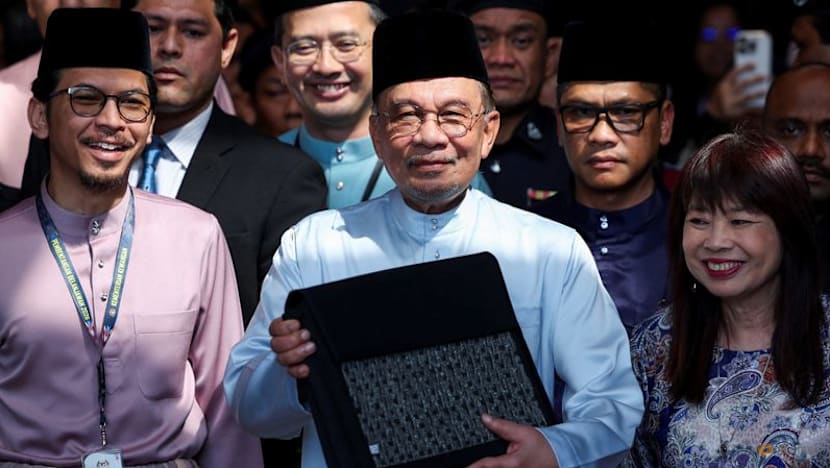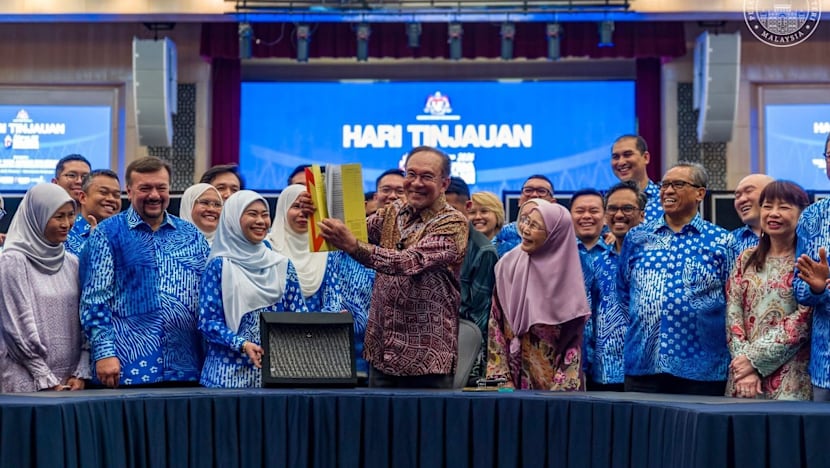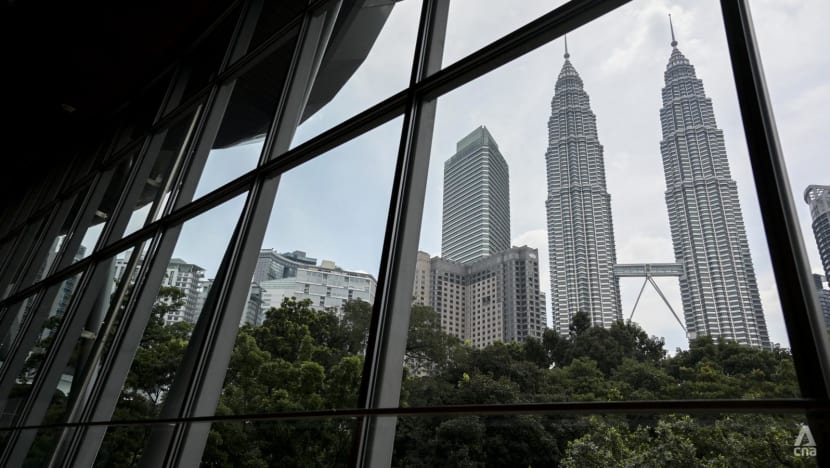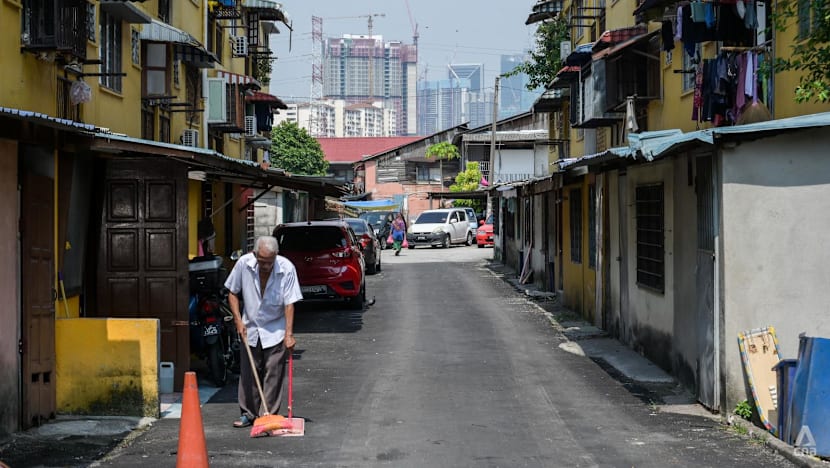Malaysia PM Anwar unveils record US$111.4 billion Budget 2026
Malaysia Prime Minister Anwar Ibrahim said that the government is on track to reduce its fiscal deficit to 3.5 per cent of the GDP next year, from an estimated 3.8 per cent this year.

Malaysia Prime Minister Anwar Ibrahim - who doubles as the country's Finance Minister - showing the Budget 2025 documents at the Ministry of Finance in Putrajaya on Oct 10, 2025. (Photo: Reuters/Hasnoor Hussain)

This audio is generated by an AI tool.
KUALA LUMPUR: Malaysia Prime Minister Anwar Ibrahim on Friday (Oct 10) unveiled a RM470 billion (US$111.4 billion) Budget 2026 that will be the country’s largest ever.
It outstrips the record RM452 billion earmarked for this year.
However, these sums include components that the government has typically not used in a budget sum as they go beyond the usual operating and development expenditures, which would be RM419.2 billion for 2026.
This was the budget figure the government had cited in documents before Anwar announced the much higher sum in Parliament that included allocations for government-linked investment companies (RM30 billion), public-private investments (RM10 billion) as well as investments from statutory bodies and companies under the ministry of finance (RM10.8 billion).
Without these, the RM419.2 billion operating and development expenditure allocation will still outstrip the record RM412.1 billion earmarked for this year, which was adjusted from an earlier allocation of RM421 billion. The 2024 figure was RM407.5 billion.
Of the RM419.2 billion, operating expenditure accounts for RM338.2 billion of the projected spending while the remaining RM81 billion is for the government’s development expenditure.
Operating expenditure covers the government’s daily running costs - such as civil servants salaries and pension payments - while development expenditure refers to funds allocated to create long-term assets like infrastructure, for instance.

Analysts whom CNA spoke to said that the budget tabled by Anwar balances fiscal responsibility with real-economy impact, noting that it is “consistent with the prime minister’s long-term plans and Madani framework”.
Madani is a slogan of the Anwar government and is based on a Malay acronym that stands for sustainability, care and compassion, respect, innovation, prosperity, and trust. It is also used to describe his unity government.
“(The) key focus of spending has been on stated priority areas such as developing economic and social infrastructure in lagging regions ... and finally, strengthening our economic competitiveness through targeted investments into high growth, high value sectors,” said Patrick Tay, who is deals partner, economics and policy at PwC Malaysia.
According to the government’s Fiscal Outlook report that was released on Friday, revenue in 2026 is projected to grow by 2.7 per cent to RM343.1 billion, compared to this year’s projected revenue of RM334.1 billion.
The government projects its revenue to be mainly contributed by tax revenue - estimated at RM270.4 billion - while non-tax revenue is projected at RM72.7 billion.
"Ordinarily, when additional expenditure is needed for infrastructure and aid for the people, additional taxes would be imposed.
“But the government has chosen to improve governance, including the targeting of subsidies without adding to the burden of the people. By doing so, we have succeeded in implementing measures to eradicate corruption, curb smuggling, and break down the walls and cripple cartels," Anwar said during the tabling of the budget speech.
“HIGHEST FEDERAL ALLOCATIONS” FOR SABAH AND SARAWAK
Anwar on Friday announced that the Borneo states of Sabah and Sarawak will receive the “highest federal allocations” for development, in line with the spirit of the Malaysia Agreement 1963 (MA63).
MA63 refers to the legal instrument signed in 1963 as the basis of the formation of the Federation of Malaysia. The agreement recognises Sabah and Sarawak not as mere states but as equal partners with West Malaysia.
“The Madani government remains committed to accelerating development in Sabah and Sarawak, (this is) not merely a promise but a real effort to bridge development gaps in basic infrastructure.”
Sabah’s development allocation will increase to RM6.9 billion, up from RM4.4 billion in 2022. Sarawak’s allocation will also rise to RM6 billion, compared to RM2.9 billion in 2022, Anwar said on Friday.
State news agency Bernama reported that RM6.7 billion was allocated for Sabah and RM5.9 billion for Sarawak in 2025 when the Budget was tabled in October last year.
Under the 2026 budget, the special grant for both states will also be doubled to RM600 million, up from RM300 million in 2023.
Separately, despite the full handover of electricity regulation to Sabah last year, Anwar said that the federal government will still channel RM1.2 billion to the Borneo state to ensure uninterrupted power supply.
He added that since 2024, RM1 billion has been allocated for water infrastructure projects in Sabah, which include pipe installation and replacement projects in several districts there.
These projects are currently underway, with completion expected next year.
CNA reported earlier that Sabah remains to be plagued with perennial problems of water and electricity disruptions as well as poor roads, ahead of the upcoming state elections.
In total, Anwar said that the infrastructure projects across the two Borneo states - which include projects like the Trans-Borneo Highway and Sarawak-Sabah Link Road - are set to amount to RM48 billion.
In its Economic Outlook report, the government projects the economy to grow between 4 and 4.5 per cent in 2026.
Meanwhile, it projects that the economy will grow between 4 and 4.8 percent this year, after registering growth of 4.4 per cent in the first half of the year.
Separately, headline inflation is projected to remain manageable, within the range of 1.3 per cent to 2.0 per cent next year. The report said that inflation was expected to be between 1.0 per cent and 2.0 per cent in 2025.
“Growth has been broad-based: Households continue to spend with confidence, investment is rising in both the public and private sectors … Even in the face of a weakened global trading environment, our exporters are adapting and sustaining jobs at home,” Anwar - who doubles as finance minister - said in the report.
In his speech, Anwar said that the government is on track to reduce its fiscal deficit to 3.5 per cent of the GDP next year, from an estimated 3.8 per cent this year.
“With continued discipline, a fiscal deficit of 3 per cent can be achieved in the medium term," he said.

HIGHER TAX COLLECTIONS
Direct tax collection in 2026 is projected to increase by 5.8 per cent to RM187.4 billion in anticipation of higher collections from companies and individual income taxes.
Company income tax remains the largest contributor to direct taxes, estimated at RM103.4 billion, the finance ministry said, on account of sustained domestic economic activity and the full-year implementation of the e-invoicing system.
Malaysia's e-invoicing rollout is a phased implementation by the Inland Revenue Board of Malaysia to digitise tax compliance, starting with large companies in August 2024 and extending to smaller businesses in later phases.
This is then followed by individual income tax, which is estimated to go up by 9.4 per cent to RM49.1 billion, reflecting a “stable labour market and continued wage growth”.
Indirect tax is forecast to rise by 8.9 per cent to RM83 billion, with Sales and Service Tax (SST) collection making up the bulk of it at RM59.6 billion.
Meanwhile, non-tax revenue is projected to decline by 9.9 per cent to RM72.7 billion primarily due to lower dividend payments of about RM20 billion from national oil company Petronas. This is down from the RM32 billion Petronas is projected to contribute in 2025.
“Recent reforms have enhanced the taxation system, making it more progressive and resilient, while reducing reliance on volatile revenue sources,” the ministry said.
“These efforts help to improve fiscal position, ensuring the government is able to meet the society’s needs while maintaining long-term fiscal sustainability.”
In his Budget speech on Friday, Anwar announced an increase in excise duties on cigarettes and alcoholic beverages, aimed at discouraging consumption and promoting a healthier lifestyle.
Beginning November, the excise duty of cigarettes will increase by two sen per stick, cigars, cheroots and cigarillos, up by RM40 per kg, while heated tobacco products will increase by RM20 per kg.
Meanwhile, the excise duty of alcoholic beverages will also be increased by 10 per cent.
"Additional revenue from (the excise duties of) cigarettes and alcoholic beverages will be distributed to the Ministry of Health, among other things, for the ministry's lung health initiative, as well as for the treatment of diabetes and heart disease," said Anwar, though he did not elaborate how much these would be.
Anwar also said that a carbon tax will be introduced starting next year, with an initial focus on the iron, steel, and energy sectors.
A carbon tax is a form of an environmental tax on greenhouse gas emissions, primarily carbon dioxide, released from the burning of fossil fuels.
“To ensure the efficiency of the carbon tax implementation, its mechanism will also be aligned with the National Carbon Market Policy and the forthcoming National Climate Change Bill,” he said.

WHAT ANALYSTS SAY
Analysts described Budget 2026 as a “steadying of the fiscal ship” that balances various policy priorities even if some have raised questions over the expansive allocations.
OCBC senior ASEAN economist Lavanya Venkateswaran described the economic assumptions underlying revenue growth as “fairly realistic”, with real gross domestic product (GDP) growth pegged at between 4 and 4.5 per cent.
She added: “Although the fiscal support to economic growth from Budget 2026 is largely neutral, (it) affirms the government’s commitment to pushing ahead with reforms and building domestic economic resilience to counter building external headwinds.”
Agreeing, economist Anthony Dass from KSI Strategic Institute for Asia Pacific told CNA that Malaysia’s ability to maintain growth above 4 per cent while reducing its deficit reflects credible fiscal resilience “in a year marked by global trade rebalancing, tighter monetary cycles, and rising energy cost”.
CNA previously reported that Budget 2026 would take into account the upcoming slate of elections due in the near future, through what some have reportedly described as being “rakyat-friendly” to win the support of the populace. Rakyat is the Malay word for “ordinary people” or members of the public.
However, an expert has raised concerns about fiscal transparency and revenue sources behind the record expenditure, noting that the government offers “little clarity” on who will ultimately bear the cost.
“While the government celebrates higher expenditure as a sign of expansion, it has not explained whether the resources derive from genuine economic growth, improved tax efficiency or greater extraction from government-linked companies or government-linked investment companies and statutory funds,” said Woon King Chai, who is the director of the Institute of Strategic Analysis and Policy Research.
Without transparent disclosure, Budget 2026 risks becoming a hidden transfer of burden from government accounts to the rakyat and public institutions, he added.
“For the third consecutive year, the government has avoided confronting Malaysia’s structural tax weaknesses. There is no mention of (the) Goods and Services Tax (GST) or a multi-year roadmap to replace the inefficient Sales and Service Tax (SST).”
He described Budget 2026 as doubling down on bureaucratic measures, such as e-invoicing, which increases compliance costs without fixing the system.
On a more positive note, Dass of KSI Strategic Institute for Asia Pacific said “delivery discipline” will determine the success of Budget 2026.
“This budget gets the direction right, but delivery discipline will determine credibility. The architecture is there - the test now is execution,” he said.
LEMON LAW AND CASH HANDOUTS
Anwar on Friday also announced that the government plans to amend the Consumer Protection Act to incorporate a 'lemon law” mechanism, specifically to safeguard the rights of consumers buying vehicles.
To help people cope with the cost of living, he said the government will provide another tranche of a one-off RM100 cash aid for all adult Malaysians aged 18 and above. The aid, which was first disbursed in August of this year, is scheduled to be disbursed in mid-February of next year.
He noted that more than 70 per cent of this year’s disbursement had been spent.
Anwar said that the initiative would cost RM15 billion next year but that it was possible because of the various subsidy rationalisation schemes implemented by the government.
The tabling of Budget 2026 comes amid tariffs imposed by US President Donald Trump aimed at addressing trade imbalances. Malaysia saw a reduced tariff rate of 19 per cent on its goods exported to the US, down from the 24 per cent that was first announced in April.
Anwar in April had considered the reciprocal tariffs by Trump as a “major threat” to the current global trade and investment system.
CNA reported earlier that businesses in the electronics and furniture sectors, which make up some of Malaysia’s biggest exports to the US, have expressed concerns over a potential “trade famine” that could force them to downsize or even shut operations.
This is the fourth budget presented by the current administration and the first under the 13th Malaysian Plan (13MP) that was presented in parliament back in July. The plan is Malaysia’s economic development plan over a five-year span from 2026 to 2030.
It outlines Malaysia’s development trajectory for the next five years and seeks to address pain points for Malaysians such as cost-of-living pressures.
“This Budget also marks the first chapter of the 13MP - not merely as a fiscal plan, but as a historical compass for the nation’s next era … (It) stands as proof that we have chosen the path of national rejuvenation and renewal,” Anwar had said on Friday.
The budget statement will be debated at the policy level for eight days starting Oct 13, followed then by responses from the relevant ministries from Oct 29, according to the calendar posted on the Malaysian parliament portal.




















